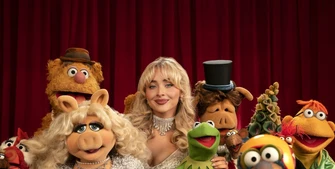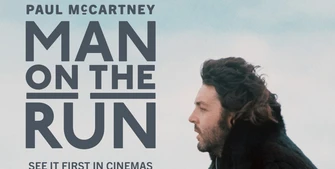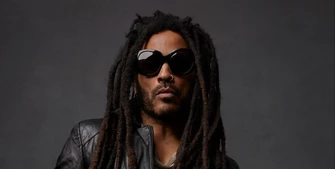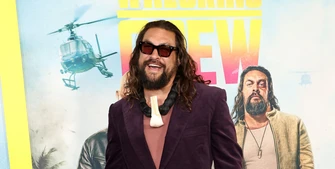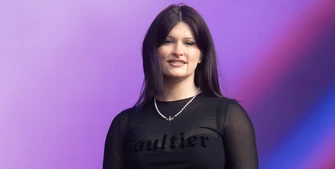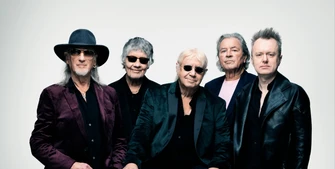Kenny Thomas on releasing his first album in 15 years, collaborating with Kim Wilde and AI
Kenny Thomas has dropped his first album in 15 years, Unstoppable, and the soul legend opens up about how creating music has changed since his heyday in the 1990s.
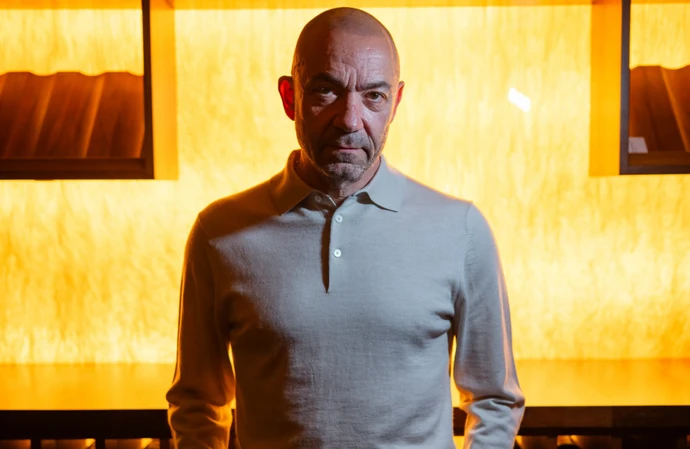
The multi-platinum selling soul legend Kenny Thomas has released his fifth studio album - his first in 15 years - Unstoppable, and he is "delighted" with the LP.
It blends his much-loved soulful sound with modern funk, bold rhythms and hot bass lines - making it appealing to a variety of genres.
And Kenny - who collaborated with 1980s pop icon Kim Wilde on the track Shout Out - is set to embark on a five-date UK tour in 2026, The Very Best of Kenny Thomas, to accompany Unstoppable's release.
Contact Music: Congratulations on the release of Unstoppable. It's your first studio album in 15 years. How are you feeling about it?
Kenny: I'm really happy with the work. It's been a very relaxed and easy album to make. There's been no pressure because I've done it as I go along, and there's no pressure like the old days of record companies breathing down your neck. So in that sense, I've been able to pick and choose what I want to put on there and the things that I've left off. There are a couple of songs that didn't make this album. They will make the next one. We're already in the process of recording. So it's good. It's been a nice experience.
CM: Do you prefer the process of making music or an album now compared to the 1990s?
K: Well, the most fun album to make was Voices, and that was the most successful, with the most amount of hits and the most amount of sales in terms of double platinum, I think it was in the end. The thing is, with that album, because there's no pressure, there was no record deal initially, there were offers outstanding, and then we had to sort of make some records as we went along. But there wasn't quite that same pressure, and time-wise. There was, in the end. In the end, we had to roll out the singles and get them going. But ultimately, we were able to make records, get together, write songs and explore things without that pressure. And then I think what that does is it just makes for a better album. That's why, historically, our artists with a first album that's massive, you generally find that the second album has corners cut, it's done hastily, in many ways, and then it tends to be not as successful.
CM: Do you think making new albums as successful as the previous ones is a challenge in itself?
K: Yeah. With my experience in the 1990s of having that massive success with Voices, then coming with the next album, Wait for Me, which had some great cuts, by the way, and some of them a little bit before their time, we were sort of pushing more towards that kind of adult soul sound, which I don't think people were ready for. They wanted more of that younger pop thing. But again, we were under enormous pressure and coercion by the record company to steer it in certain ways. All we really wanted to do at the time was make another Voices, but we didn't because it was being steered and manipulated in certain ways from above, from those in power. And that was all to do with timescales and delivery, and meeting deadlines. So I think my experience now, over the last 15, 20 years of my life, is writing songs and making recordings as I feel like I want to do.
CM: Why is it taking you two decades to release a new album?
K: There was a jazz album in the middle of that somewhere, where I did a piano vocal album with a pianist called Wayne Brown, and we call it The Thomas Brown Affair, and that got support on Jazz FM and stuff like that. And there have been numerous other records made. The last two years, I put out a record called Contagious, and then another one called Got It on Time, and they were like, stand-alone records that were well received within the soul world. And so it's not like I've been recording, but this is the first time I've got together a body of material. This really is a completely and totally new album with a whole theme and a vibe running through it with consistent sound.
CM: You have quoted Unstoppable as your "best work to date". What makes it different to your previous albums?
K: I'm only calling it my best work to date because that's the feedback I'm getting. People in the industry have listened to it and said, 'I think this is the best album he's made.' So in a sense, I'm pleased with it, and I'm glad I'm getting that kind of response from some people that I respect.
I also think because it's soul music, and when I do soul, let's say, it's got its roots in blues, it's got its roots in gospel. I think that when you start to do enormous amounts of shows, like I've done over the years, enormous amounts of recording, you definitely start to really discover what you do, and how you do it, and how you sing. I know that world, and I've bought a lot of records as a kid and consumed a lot of soul music and read a lot about it. And you find that some artists, they've had some big careers, with the pop side of it, but some of their later work - let's take Marvin Gaye, for instance, had all of those hits with Tammi Terrell and stuff. Then, when you start to get on to the later stuff, like Sexual Healing and all the rest of it, they weren't enormous hits off those albums. But they've ended up being the most iconic and best work that they ever did because they were of an age. Their writing had improved, their songwriting had improved, and their singing had improved a lot. So they become more authentic. So with myself, I've done this for a long time. What I did in the 1990s was great. It's acceptable. There were hits, and there were great songs. But as a soul singer, I think now I'm singing as I should be, and it's in the right place, and it feels right, and I'm writing the right kind of songs I want to write. So it's that maturity that comes with it, because it's soul, and it's in that world of blues and jazz, and they're all linked. They do become better. They should ultimately become better with age.
CM: What is the biggest improvement you've made in your career?
K: It's been an evolution, and there's a development, and you start to develop your style and what you're doing. I mean, there have been some things over the years that have been great; I co-wrote a song that Rod Stewart recorded, I co-wrote a song that George Benson recorded, and those are great things to have on my CV. But I think for my own self and my own songwriting, you can see if you trace it back to some of my earlier stuff that I wrote - and also I've done an enormous amount of covers as well, which I always enjoy doing that. But if you see the early stuff, you can see the infancy of it, and the maturity of it. But also at the same time, I still inject that deliberate flavour of youngness. Some of my vocals are right where they should be - deep, like a baritone. Someone would be placing it in a higher, whiskey, younger sound. And that's another reason why Voices was called Voices, because we discovered in that year of making Voices that I could play around with the instrument.
CM: Why do you think it's important to mix elements of what you did in the 1990s with new stuff?
K: I think it's important for me to just show people the continuity. I can do this with it. I can play around with it. I go into my studio here, and I might do four or five takes on a song, and in those four or five takes, I'll work out which one of them is the approach; so, should it be wispy? Should it be light? Should it be heavier? Should it be deeper? Should it be pushed more? Should it be softer? I've just recorded another song in the last three or four weeks, and it's got a really nice light sort of tone, very pop, but soulful. But I've decided, if I push it and if I go harder at this song, it's not going to work. That's the thing that comes with experience, and also the fact that you've got time to experiment.
CM: Is that what sparks your creativity?
K: Yeah. And also storylines. But on this album, it's also quite unique. It's a bit of a family affair; I've got my wife writing songs on there. For instance, the Walking Man song, is very different from the rest. She wrote that 100 per cent. So she's very creative. You've also got my nephew Nathan Thomas, who I wrote Unstoppable with, and he's only 10 years younger than me, so he's got a bit of a younger head, a bit more of a pop approach to things. So he's calling on and drawing on different vibes from different people as well. So it's not like a one-man thing, it's the pot of other flavours.
CM: That's quite nice because, as your songs have different genres, it can appeal to more audiences
K: I think so. I see a lot of younger people now at the soul festivals I go to. I did one two weeks ago, and I was really surprised that there were kids there who weren't even born.
CM: Why do you think people can connect with your music?
K: The songs are traditional. They're love songs. It's been the greatest theme of music forever. It is about heartache, heartbreak and and all those kinds of things. I think people can relate to that, because at some point we all will love, and we feel love, and we feel lost, and there are all of those things that go with that, our interactions and relationships with other human beings.
CM: What's the meaning behind Unstoppable? How did you come up with that name?
K: I didn't. My nephew wrote that chorus, and then he got a lot of the songs down, a rough version of it. And I came in and did a lot of tweaking and changing, and steering and arrangement, and then it just struck me that I loved the title of it. And so it was a great, cracking title for this album. I've even got the name for the next album, and it's like a nice little strap line. But what struck me was it's like tempting fate because we know that nothing is unstoppable, right? There's no career that's unstoppable. Everything has naturally got its sell-by date in this life. But you could say after 35 years of this, it's got that kind of unstoppable element. I've always said, 'I'll stop when I drop,' and that may be coming.
CM: How did you come up with Shout Out?
K: I wrote with a dance duo, the dance producer and DJ, called Full Intention. They're really well known in that world of glitter box and defective records. They're really cool. So I've known them for years, and I wrote that with John Pearn, out of Full Intention, some years ago, and I was just sitting on that, along with a number of other songs that I've decided to dig out on CDs, CDRs. And I've got hundreds of dat tapes with old songs on them. And I was just having a rummage through. It ended up in a few days of painstakingly going through DAX and CDs, and I stumbled across that one, and I thought, 'I'd forgotten about that song.' My managers went, 'Wow, that's a nice dive.' I said, 'Yeah, it needs updating. It needs changing and it needs a rewrite in places.' But I think you could say that 75 to 80 per cent of it is pretty cool. So then what I did was, I managed to get the vocals off of that old demo using AI, which didn't exist in the 1990s, of course. So I managed to strip my old vocal off using AI, and then send that to Sweden, and he managed to construct a new groove, send that back to me. And then I continued to write and change it, and that's how it kind of it developed. You could have done any of this in the 1990s. This idea of ripping a vocal off with artificial intelligence, and then transferring those files within seconds to Sweden, to the studio there, that stuff was unheard of.
CM: Do you think AI is a valuable tool for musicians?
K: It's got its uses. I'm no aficionado on it. I know it in a very limited way. All I know is that with the Logic Pro program I use to strip the track apart, and that was very handy to take that vocal off. And so we had the bare bones of something to work with. Of course, at some point, AI falls short, and humans have to step in. And so once we constructed our new bit of music around that vocal, which I ripped out my own track, we then had to discard that. And then, you know, you get into proper recordings.
CM: Going back to Shout Out, what is the message behind the song?
K: It's a really innocent and simple, positive record. It's meeting someone, they're changing your life. You're changing theirs, the future's optimistic. And it's really just like when someone says, 'I want to shout out from the hilltops or from the rooftops that I've got love.' You've got lots of love to give. And so it's a really positive celebration of human love.
CM: Why did you think Kim Wilde would be the perfect person to collaborate with on Shout Out?
K: I'd love to say that that was my - you know, when something's right under your nose and staring you in the face, and you just don't see it. It was one of those. I know Kim, and I know her brother, Ricky, and he's a great writer. He wrote Kids in America and other hits of hers. I wrote the record, and it was done. It was in the bag, and it sounded great; we thought we sounded great. And it was earmarked to be a single. And then someone, who my manager knows, a very powerful plugger in the game, said, 'Look, this really could do with a female on it.' It never occurred to me. I thought, 'OK, well, actually, yeah, it could do that. It's got the room, and it's got the space to do it.'And he said, 'Really, you should go and use someone like Kim Wilde. She's a fantastic singer. She's seriously still active, touring America, Australia, touring Europe. She's busy, sounding as good as ever, and she's just a very lovely person. Ultimately, I think, she's a grafter. She works, she's never stopped working, and she's sounding great, and she's a legend. What she's done on it sounds soulful to me. It was just a great fit. And she sent me a text and said, 'This song sounds like a banger.' And I said, 'Kim, it does now you're on it.'
CM: You're going out on tour next year, and it's one of your biggest headline shows to date. How are you feeling about that?
K: It's been amazing the last two, three years, going to do London Palladium and selling out these venues that we didn't sell out even at the peak of my career, and we didn't do them at the peak of my career. Seeing and experiencing that is amazing. And obviously now we're moving up to the Hammersmith Apollo, which is great, and we've got to sell the tickets first, so we never count your chickens. But they're on sale. I understand that they're doing well. But that place is special, because that's where, if you were into your soul music, certainly through the 1980s and the 1990s, that's where we would have seen some of your iconic pop stars. So I saw a number of gigs there over the years as a youngster, and so now to be playing that stage is great, and it's a privilege. You do step back and have a sort of out-of-body experience.
CM: Do you have, like, any rituals before you perform?
K: Not really. I mean, obviously, warming up the voices is a standard ritual that has to be done. And methods for that have changed. People are doing their scales, and there are different things now that are used to warm their voices up in different ways. I hang out with the band. We generally have a chat, and everything's very relaxed. I used to do all sorts of things in the past, and sort of get myself physically kind of work - when I was younger, I did a lot of boxing, I'd get the old boxing, skipping, just to get the heart rate up. Yeah, just, you know, warm my voice, keep it relaxed, you know, and just get on with it.
CM: Do you have anything that you could have done differently in your career?
K: There were times in the 1990s when you think, 'Well, I could have done that differently? I wish I hadn't listened to that person in a company. I wish I hadn't cut that record. I wish I had probably gone a slightly different way.' And then there's the other thing of being young, being in your 20s, having an enormous amount of success, travelling all over the world, and some of it becomes a bit of a blur. It's so busy, it's exhausting. Of course, with that comes the escape mechanisms. You know, the way, how do I escape from this? We're talking about the 1990s now, where, you know, huge amounts of mega clubs in London and lots of faces milling about having great times and falling out of clubs at silly o'clock in the morning, all of those things. You look back and think that old saying that youth is wasted on the young is so true,' because you can think, 'Hold on a minute.' Everyone in the company did a hell of a lot of socialising and partying and stuff like that. And everyone's got to have their escapes, and they work hard and play hard and all that kind of thing. But I look back and I think, 'You know, if I've had this, the head I've got now, the way I think now, in my 40s and 50s, I'll be utilising my time a little bit better and more creatively.' Instead of just saying, 'Right, we've done that record. It's been a hit. Let's go out and have a great time!'
The Very Best of Kenny Thomas 2026 tour dates:
19 March - Gateshead Glasshouse
20 March - Manchester Apollo
21 March - London Eventim Apollo
25 March - Southend Cliffs Pavilion
26 March - Birmingham Symphony Hall



